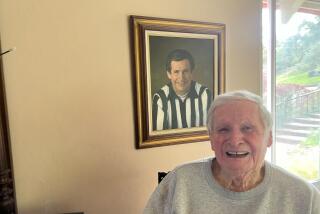The ‘H’ Is Back in Eric, Geyer Is Back With Sockers
- Share via
SAN DIEGO — First, there is the matter of the name.
If you look in an old Sockers’ media guide you’ll find that Erich Geyer, the team’s newly appointed assistant coach, used to spell his name Eric. That is not the correct way. It is the way he figured Americans would pronounce it.
Erich with an “H” has a soft hissing sound at the end, the way people in his native Germany pronounce it.
Then, there is the nickname.
“The Wolfman.”
Somebody was watching Geyer eat pig’s knuckles in a German restaurant a few years back and told him he was eating like a wolf.
Geyer said: “What are you talking about? I’m just hungry.”
The nickname stuck. The other day, Geyer was saying he never really liked it much. He refered to it as “That dumb nickname.” Midfielder Brian Quinn, a teammate of Geyer’s as a rookie during the 83-84 season, isn’t buying that for a minute. He recalls the attention Geyer got from it, attention that he doesn’t think bothered Geyer a whole lot.
“They would write stories about him every week,” Quinn said.
And remember, when he was traded back to the Sockers after a short stint with the Chicago Sting, he had “Wolfman” on the back of his jersey.
The Wolfman has returned. This time, to teach.
Socker President Ron Cady says: “There’s one word I picture for Erich Geyer. It’s not Wolfman. It’s intensity.
“If there is one thing I’d like to see us exhibit on the field it’s intensity.”
That is exactly what Geyer did when he was on the field.
A look back.
Ten years ago, when Geyer was 29, the coach of his second-division club in Germany told him he was too old to play and cut him. Not being the type to let one man’s opinion end his career, Geyer bought a ticket to San Diego.
A short time later, Socker Coach Ron Newman was told by a friend that he should have a look at Geyer. Newman wasn’t overly enthusiastic.
At the time, Newman said: “I looked at Erich’s resume, and nothing really impressed me enough to make me want to run around and get him over here. If he showed up, I would do the courtesy of looking at him.”
He showed up.
But before we get to all this about Geyer actually making the team, there is another twist. At the time of his tryout, the Sockers were in need of a defensive player. Geyer had always been a forward. With players such as Juli Veee, Kaz Deyna and Jean Willrich around to score goals, the Sockers needed another guy up front like Don King needs hair spray.
So Geyer decided it was in his best interests to tell Newman he was a defender. Newman laughs about that now.
“Does he look like a forward to you?” Newman asks.
Geyer is six feet tall and weighs just a handful of pounds less than 200. He probably would have been a good rugby player.
Anyway, Newman gave him a chance to play in a couple of outdoor exhibition games and Geyer was adequate, if unspectacular. The third time out, he was assigned to mark Roger Davis, who was the league’s leading scorer the previous season. He did a pretty good number on him and left him with a few reminders. A black mark here, a blue mark there.
“Everybody was saying ‘Who is that nut?,’ ” Geyer recalls.
Davis even asked him what the heck he thought he was doing.
Geyer responded with: “You do your job, I’ll do mine. I need a contract.”
And so it happened. Geyer became a Socker.
A while later, Newman was talking to the same friend who had tipped him off about Geyer. During the conversation, it came up that Geyer had always been a forward. Newman couldn’t believe it.
“I never knew he was a forward,” Newman said. “And Erich wouldn’t have said ‘Boo.’ He just wanted to make the club.”
Geyer quickly became a crowd favorite. He was the first player to wave a towel over his head, which soon became popular with the fans. He also made a big splash Feb. 20, 1985 in a game against Las Vegas. Just before the game, the Sockers traded to get him back from the Chicago Sting and didn’t tell anybody. He put on his uniform away from the other players and then came out waving the towel when his name was announced. The crowd went crazy. The Sockers won.
Geyer was never dazzling on the field. He didn’t have the footwork of Deyna or Veee. What he offered the defense was a certain stability. He was always dependable.
“He was a blue collar player,” Newman said. “You never expected anything exceptional from Erich, but you knew if you had to go against him it wasn’t going to be easy.” Said Quinn: “I don’t think he’ll ever be confused with a finesse player.”
Geyer isn’t tip toeing into his new job, waiting until he adjusts to the temperature of the water. You can hear his voice echoing from every nook and cranny of the San Diego Sports Arena during the team’s two-hour practices.
The other day he was watching a passing and scoring drill, and suddenly he decided this wasn’t providing the team with much of a test.
“Let’s make it more competitive,” he said, situating himself in front of each player and making them swerve around him on the way to the goal.
A couple of players did it wrong.
“No, no,” Geyer yelled. “Off the boards.”
This is a change from Weller, who was quiet and understated. Weller would pull a player aside and explain what he wanted. Geyer explains from a distance. Quinn says Geyer’s enthusiasm might give the Sockers a boost. At 7-8, they are in need of one.
“It’s different,” Quinn said. “We haven’t had it for such a long time. It may rub some people the wrong way, but that’s never been a problem with this club.”
Even talking casually to Geyer, the conviction of his character often emerges. He’ll often punctuate his thoughts by shaking his fist, and he doesn’t sugar coat his words.
“I will talk straight out,” he said. “I know most of the players. I think there’s a mutual respect.”
As an assistant coach, Geyer is a complete package. He brings more than motivational skills.
Geyer has played throughout Europe, and traveled all over the world. After retiring from playing in 1985 he coached the Chicago Sting for 77 games between 1986-88. He was fired 33 games into his second season. Before accepting the job with the Sockers, Geyer organized a youth soccer league in La Mesa. Involvement in the community is important to the Sockers, who are continually trying to find ways to fill the stands.
Geyer also spent a year as a Major Indoor Soccer League referee. Like most referees, he wasn’t always well received. He got a good, old fashioned booing by Socker fans once for calling a foul on Steve Zungul for being too aggressive. Such irony. Erich Geyer penalizing someone for being too aggressive.
At the time, his thought on being booed was this: “The boos are the applause of the referee.”
Now back in the coaching ranks, he’s wearing a different hat. Aggressiveness is something he’d like to see more from this team, particularly in view of the abolition of the six-foul rule, which used to give a power play to the opponent after six team fouls.
“Without the sixth foul rule,” Geyer said, “you expect a certain aggressiveness coming up.”
So that’s what he will expect from the Sockers.
There is a side to Geyer not seen on the soccer field. Asked to describe himself, the words he chooses are “honest” and “open-minded.”
He might look intimidating, but Newman says otherwise. “He’s a big pussy cat, really. I find him a nice guy, just a genuine fellow.”
Geyer was once asked to describe his off-field activities and he included reading, going to the beach and tending to his cactus garden. Doesn’t seem to fit.
Of course, his former teammate, Lorenz Hilkes, made a good point at that time.
“He can’t be the same off the field that he is on,” Hilkes said. “It would be impossible. The police would pick him up.”
The police didn’t. The Sockers did.
More to Read
Go beyond the scoreboard
Get the latest on L.A.'s teams in the daily Sports Report newsletter.
You may occasionally receive promotional content from the Los Angeles Times.










